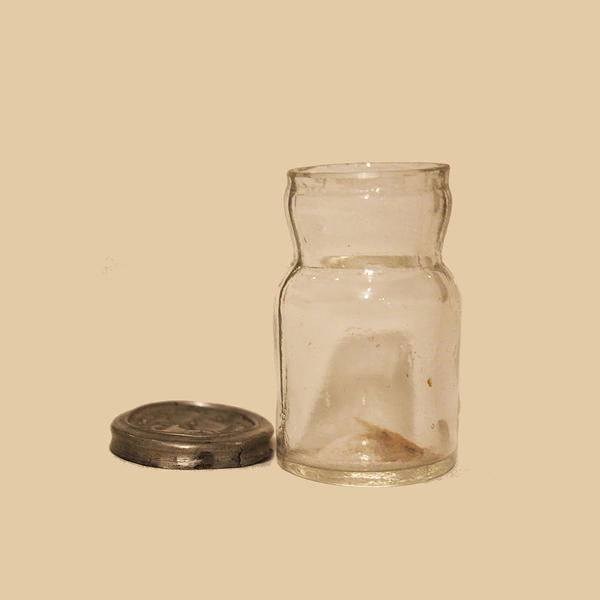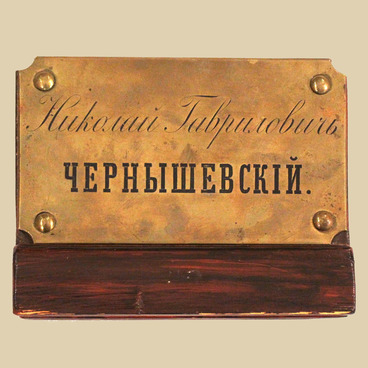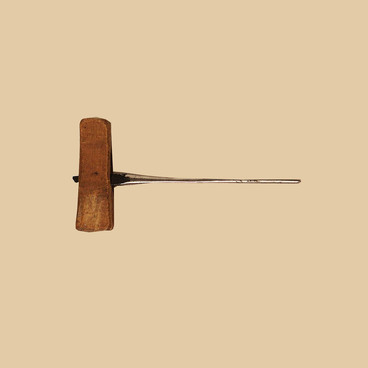After 7 years of penal servitude in East Siberia, Nikolay Chernyshevsky was transferred from Alexandrovsky Manufactory to a prison of the Yakut town of Vilyuisk. The transit by a winter road took over a month and was very difficult.
Having been advised of Chernyshevsky’s transfer to cold Yakutia, Alexander Pypin sent him a jar of cold cream. He might have done that on the advice of his sister Eugenia, who was then attending lectures in a Medical Academy and knew what remedy would be suited for severe northern conditions. Also, Pypin is known to have sent Chernyshevsky a parcel of medicines on 14 May 1877.
Cold cream is a white ointment invented in England and made of a mix of almond oil, wax and spermaceti oil. Upon applying it on the skin, the skin receives maximum moisture as well as wind and frost protection. On the jar lid there is an inscription: “Laboratoire chimique de St.-Petersbourg”, which means “Chemical Laboratory of St. Petersburg”.
Nikolay Chernyshevsky did not throw away the jar after use: it might remind him of close female relations and female care. Moreover, the jar proved useful in the writer’s most scanty household. It began to serve him as an inkpot: he dipped his pen into it when writing a letter to his wife to persuade her from coming to stay with him: ‘What is Vilyuisk? This place is only called a town. In fact, it is not even a village, not even a hamlet: it is something so small and desert that there is no such other thing in Russia’.
Traveler Tomasz Augustynowicz who visited Vilyuisk in winter, left the following description of the town: ‘One cannot see a smallest sign of life, the streets are always desert, there is silence everywhere <…> Wherever you turn, you will face the silent taiga that surrounds the town from all sides like a high circular wall’.
It is exactly in such wilderness that Chernyshevsky, being 42 years old, was confined ‘by order of His Imperial Majesty’. The man in the prime of life, having colossal intellect, comprehensive knowledge and public esteem was deprived of any and all chances to express himself except in cautious letters to friends and relatives.
Having been advised of Chernyshevsky’s transfer to cold Yakutia, Alexander Pypin sent him a jar of cold cream. He might have done that on the advice of his sister Eugenia, who was then attending lectures in a Medical Academy and knew what remedy would be suited for severe northern conditions. Also, Pypin is known to have sent Chernyshevsky a parcel of medicines on 14 May 1877.
Cold cream is a white ointment invented in England and made of a mix of almond oil, wax and spermaceti oil. Upon applying it on the skin, the skin receives maximum moisture as well as wind and frost protection. On the jar lid there is an inscription: “Laboratoire chimique de St.-Petersbourg”, which means “Chemical Laboratory of St. Petersburg”.
Nikolay Chernyshevsky did not throw away the jar after use: it might remind him of close female relations and female care. Moreover, the jar proved useful in the writer’s most scanty household. It began to serve him as an inkpot: he dipped his pen into it when writing a letter to his wife to persuade her from coming to stay with him: ‘What is Vilyuisk? This place is only called a town. In fact, it is not even a village, not even a hamlet: it is something so small and desert that there is no such other thing in Russia’.
Traveler Tomasz Augustynowicz who visited Vilyuisk in winter, left the following description of the town: ‘One cannot see a smallest sign of life, the streets are always desert, there is silence everywhere <…> Wherever you turn, you will face the silent taiga that surrounds the town from all sides like a high circular wall’.
It is exactly in such wilderness that Chernyshevsky, being 42 years old, was confined ‘by order of His Imperial Majesty’. The man in the prime of life, having colossal intellect, comprehensive knowledge and public esteem was deprived of any and all chances to express himself except in cautious letters to friends and relatives.



